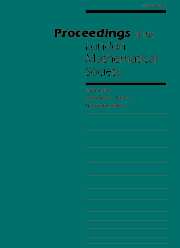Article contents
Chinburg's third invariant for Abelian extensions of imaginary quadratic fields
Published online by Cambridge University Press: 01 January 1997
Abstract
In this paper the authors provide strong evidence for a conjecture of Chinburg in the context of abelian extensions $N/K$ of quadratic imaginary fields $K$ with group $G$. For abelian groups $G$, the conjecture specialises to the statement that Chinburg's third invariant $\Omega(N/K,3)=0 \in \mbox{Cl}({\Bbb Z}[G])$. We prove (Theorem 1) that if $K$ has class number 1 (and some technical conditions on the conductor of $N/K$ and its roots of unity hold) then $\Omega(N/K,3)$ lies in the kernel group $D({\Bbb Z}[G])$. For a special class of genus extensions of prime power degree we prove (Theorem 2) the full conjecture, that $\Omega(N/K,3)=0$. The proof technique for Theorems 1 and 2 uses Kolyvagin's Euler systems of units applied to certain explicit groups of elliptic units, which essentially determines the difference in Galois structure between units and ideal class groups over the maximal order ${\mathcal M}_G$ in${\Bbb Q}[G]$. This is made precise by using Hecke factorisation and working in the factorisability defect class group of the category of finitely generated ${\Bbb Z}[G]$-modules, which is isomorphic to $\mbox{Cl}({\mathcal M}_G)$. For Theorem 2, the fact that the class number of $N$ is coprime to $[N:K]$ in such genus extensions $N/K$ allows one to lift these results to $\mbox{Cl}({\Bbb Z}[G])$, after using cohomological calculations to check that (essentially) an explicit representative for a Tate sequence defining $\Omega (N/K,3)$ has the correct extension class (which is related to the fundamental class of $N/K$).
1991 Mathematics Subject Classification: 11R33.
- Type
- Research Article
- Information
- Copyright
- London Mathematical Society 1997
- 1
- Cited by


